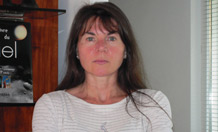
Professor Isabelle Baraffe.
Lecture on the search for new planets and new life
One of the world’s leading experts in studying distant planets is to give her inaugural lecture on the cutting-edge research which is leading the hunt for new worlds and new life.
Professor Isabelle Baraffe, head of the University of Exeter’s Astrophysics department, will give her talk from 6pm to 7pm on Wednesday, 9 March at the Newman A Lecture Theatre on the Streatham campus.
She will focus on the fascinating progress made in the field of studying planets outside of our solar system, known as exoplanets, up to 50,000 light years away from Earth.
Professor Baraffe said: “This is a really exciting area of research because it is moving so rapidly thanks to advancing technology and the development of new techniques.
“This is opening up new avenues of research all the time and the diversity of new planetary systems discovered so far opens a range of new problems in science, with many possible impacts in our understanding of climate, biology and planetary science.
“We hope that as our understanding improves and the technology continues to advance we will be able to detect many Earth-like planets and be able to start searching for life on these distant worlds.”
Professor Baraffe is a leading expert in this area and has won several awards and commendations for her work. Her expertise covers a wide range of physical conditions, from Earth-like planets to massive stars.
During her lecture, she will talk about some of the work carried out by the Astrophysics department at the University of Exeter, which is recognised as one of the world’s leading groups in research on star formation and exoplanets.
The study of extrasolar planets is also a key part of the university’s Science Strategy, which aims to bring together academic staff from multiple disciplines to carry out cutting-edge research.
Professor Baraffe’s lecture is open is open to the public and is free to attend. There is no requirement to book. Anyone wanting more information should contact Anne Douglas-Crawford at the university on 01392 725764.
Date: 8 March 2011
